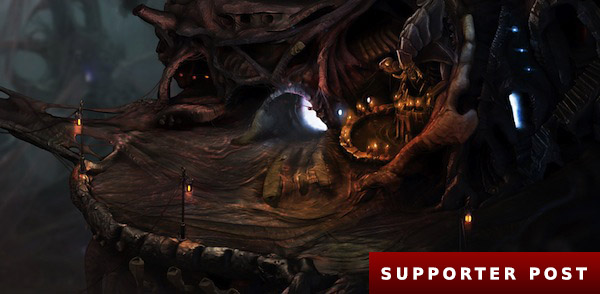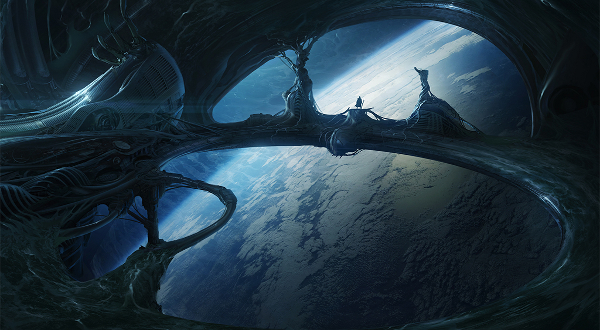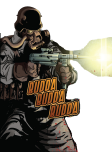Why P’n’P Numenera Makes Me Interested In Torment
I’m looking forward to inXile’s
Torment: Tides of Numenera, like nearly everyone else who works at RPS. The difference is that I never played Planescape: Torment, the game Tides aims to spiritually succeed. Instead my interest comes from the other end of its name, since I’ve been playing
Numenera, the Monte Cook pen-and-paper RPG that gives this new game its setting and some of its mechanics.
I’m a recent visitor to the shores of pen-and-paper, and I’m currently playing two games that form an interesting contrast. The first is Dungeons & Dragons, which I’m playing with Jim and John. It is among the most obvious inspirations for all kinds of videogames, and it’s been interesting learning its systems this past year. We play 4th edition – I’ve no idea how it compares to the others – but it’s fast, combat-heavy, and has an awful lot of numbers.
Numenera has considerably fewer numbers and focuses much more on shared storytelling. Perhaps most significantly, any player can attempt any task and have a chance at succeeding – skills simply reduce the cost to the player making the attempt, by making the task easier. In
our interview with him, Torment design lead Adam Heine described the system like this:
Say the ancient ruins you’re exploring are trapped by a complicated prior world detonator. To disable this thing would be a difficulty 6 task, which on the Numenera scale is very hard – an untrained character could only succeed about 15% of the time. Training in any skills that apply will lower this difficulty up to two steps per applicable skill. So someone specialized in, say, Lore: Machinery would attempt the task as a difficult 4, with a 45% change of succeeding.
Additionally, there’s the concept of Effort, where you can spend points from the appropriate Stat Pool (in this case, Speed) to lower the difficulty even further. An untrained character of a high enough level could spend points to use 4 levels of Effort, reducing the difficulty to 2 and giving themselves an 85% chance of success. And if our specialized character did the same thing, they’d reduce the difficulty to 0. When this happens, the task automatically succeeds—no roll is made and there is no chance for critical failure.
This would seem to make skills less important because anyone can try anything and have a shot at succeeding, but in practice the maths still make you want to rely on whichever of you has a particular talent for persuasion, glaives or manipulating the world’s de facto “magical” items, which are called Numenera. In the videogame, it should mean that Torment allows you to make extreme character builds, without the devs needing to fear that players will block too much of the game off for themselves or end up crippled.

I should briefly explain the setting itself, because it’s part of the reason why the game is so interesting. Numenera is set on an unrecognisable earth millions of years in the future. There have been nine civilisations between now and then, and it’s suggested that at least one of them was not human. The world is therefore covered with strange artifacts – ancient machines, essentially – which no person understands how to make and few people understand how to use. This idea has at least one obvious source, in the Arthur C. Clarke quote published at the front of the game’s source book: “Any sufficiently advanced technology is indistinguishable from magic.”
In practice what this means is that you might find a Numenera item in the world, and it might function an awful lot like a gun, but it won’t be called a “gun” because that word won’t exist in this time, and it’s likely that whatever ammo you find with it will be all the ammo you’ll ever have for it.
It also means the Numenera can offer a lot of variety. I used a landmine to blow up a future-cow, so we could get its meat to eat. I snapped a person’s neck and then swallowed an invisibility pill in an attempt to escape. I now have some sort of Wiki Ear device that can whisper information into my brain. We ride around on a low-flying vehicle, visiting backwater villages and rural traders and resisting the urge to use our matter-consumer to solve all our problems. In the new Torment, I’m hoping this translates to a vast array of problem-solving and combat tools.
Skill systems and lore and combat and items are all great, clean things to convert into videogame-land for Tides of Numenera, but there are one or two other parts of the pen-and-paper Numenera that I’m enjoying, which I haven’t explored enough because I’m new to roleplaying, and which I think are probably a much harder fit for something running on a computer.
The first is GM intrusions. At any point, the GM can decide to step into the story and say, hey, this thing you’re doing? It just got a whole lot harder because that ladder you’re on just broke.
At this point the players have two choices. You can either run with it, perform some deft dice rolls, and come out of the scenario with a cool story and an extra bit of XP. Alternatively you can
spend one of your XP points to say, “Nah, sod off GM, that doesn’t happen –
this does.” In which case it didn’t happen or you simply write your own immediate solution. This is a neat bit of communal storytelling that has you negotiating your own experience, and it’s the kind of thing pen-and-paper is obviously perfect for and videogames, with all their art assets and so on, are obviously not.
The other bit is that you can also spend a bit of your XP in order to write a part of your character’s backstory. When we blew up the future-cows – called
Aneen, by the way – we wanted to make sure we got a good haul of meat afterwards. I spent an experience point to tell a short story about an uncle of my character being a butcher, and how I would help him in his shop as a boy and therefore picked up some basic butchering skills. Hey presto, a belly full of Aneen meat with enough to trade to a caravan we encountered later that day.
This is the sort of stuff that D&D, in my admittedly limited experience, doesn’t allow for. This is the sort of stuff that makes Numenera really exciting to play and a powerful tool for storytelling. It’s the reason I’m interested in Torment: Tides of Numenera but precisely the kind of thing I think the game will struggle to represent.
I’m not sure if they’ll try. There is at least one new system we know about in the game – the Tides system, explained in its
original Kickstarter pitch. It tracks the decisions you make throughout the game and assigns them possible motivations, crafting an alignment system but one designed to be more nuanced than simply dark side/light side. How it works in practice, or whether its expressive and responsible capabilities make up for the power of the pen, I have no idea.
But I suspect the game will have to chart its own path, and I imagine that’s why it’s not a Numenera game alone. People seem to like Planescape: Torment, yeah?

































![The Year of Incline [2014] Codex 2014](/forums/smiles/campaign_tags/campaign_incline2014.png)






